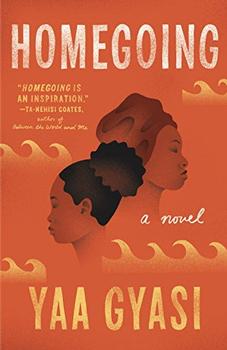Summary | Excerpt | Reading Guide | Reviews | Beyond the book | Read-Alikes | Genres & Themes | Author Bio

21-year-old Afi is a talented Ghanaian seamstress eager to study fashion design, but her life is upturned when her mother agrees to an arranged marriage with a virtual stranger, the son of a wealthy local businesswoman, on her behalf. Afi is whisked from her small town and placed in a luxury apartment in the capital of Accra. It soon becomes clear that Afi's husband Eli is already in love with someone else, a woman his family disapproves of, and that his family has set up his marriage to Afi to lure him away from her.
This "other woman" lingers on the periphery for almost the entire novel, and I thought this was a very clever narrative decision. It allows her, the rival who is never seen but whose presence is always felt, to remain as elusive to the reader as she is to Afi. It also emphasizes that the contention between her and Afi is born wholly from the influence of others, and not through any fault of their own.
There is clear critique here of the widespread practice of unofficial polygamy in Ghana. Afi and Eli's traditional wedding is recognized by their community but it is not legally binding in the same way a modern ceremony would be. Men having multiple wives in a non-legal capacity is commonplace, so Eli believes himself to be free to continue pursuing relationships elsewhere and thinks that Afi should accept this without question. Without ever adopting a judgmental tone, Medie highlights the ways in which the practice of locking women into moral contracts without proper legal protection or reciprocal opportunities upholds patriarchal structures, enforcing longstanding division between genders and classes.
Medie brings this West African nation's rich and complex culture to life on the page, showing the contrast between the traditional customs still upheld by many (particularly in more rural areas) and the increasingly cosmopolitan way of life spreading throughout the capital. This paves the way for the author to explore wealth disparity and how much emphasis is put on a family's standing within the wider community. Afi's relatively poor, widowed mother agrees to marry her daughter off for the prosperity and prestige it will bring them, and Afi feels the burden of this, trapped by her obligation to provide for her loved ones. Making it clear that money equals power within this society, Medie shows that it is only as Afi begins to gain her own financial security that she finds the confidence and means to defy those who seek to control her.
This arc that Afi follows throughout the novel is a pleasure to watch unfold as she transforms from a powerless, naïve girl who shyly submits to her husband to a bold and confident woman who stands defiant. It is particularly satisfying that her autonomy is ultimately won not through explosive drama but the cultivation of her own career, relationships and self-worth.
As Afi finds her voice and the story moves towards a somewhat inevitable conclusion, it becomes increasingly clear that our heroine is perhaps not so different from her supposed enemy. The implication that the two women have been pitted against each other precisely because they share a similar attitude of rebellion against the status quo is loaded with further thematic potential. It is here that the book may have benefited from a little more depth, when the "other woman" should arguably have been given her moment in the spotlight at last. Still, for its relatively understated approach, this is a propulsive novel that flips between easy-read escapism and meaningful social commentary with impressive ease.
![]() This review was originally published in The BookBrowse Review in September 2020, and has been updated for the
August 2021 edition.
Click here to go to this issue.
This review was originally published in The BookBrowse Review in September 2020, and has been updated for the
August 2021 edition.
Click here to go to this issue.

If you liked His Only Wife, try these:

by Yaa Gyasi
Published 2017
Winner of the 2016 BookBrowse Debut Author Award
A novel of breathtaking sweep and emotional power that traces three hundred years in Ghana and along the way also becomes a truly great American novel. Extraordinary for its exquisite language, its implacable sorrow, its soaring beauty, and for its monumental portrait of the forces that shape ...

by E.C. Osondu
Published 2016
A vivid, fully imagined portrait of an extraordinary African family and the house that holds them together.
Your guide toexceptional books
BookBrowse seeks out and recommends the best in contemporary fiction and nonfiction—books that not only engage and entertain but also deepen our understanding of ourselves and the world around us.